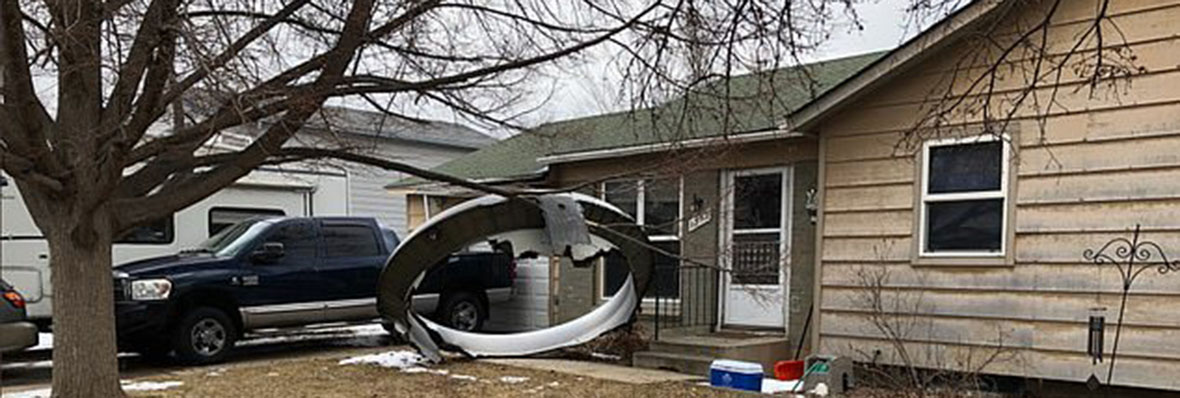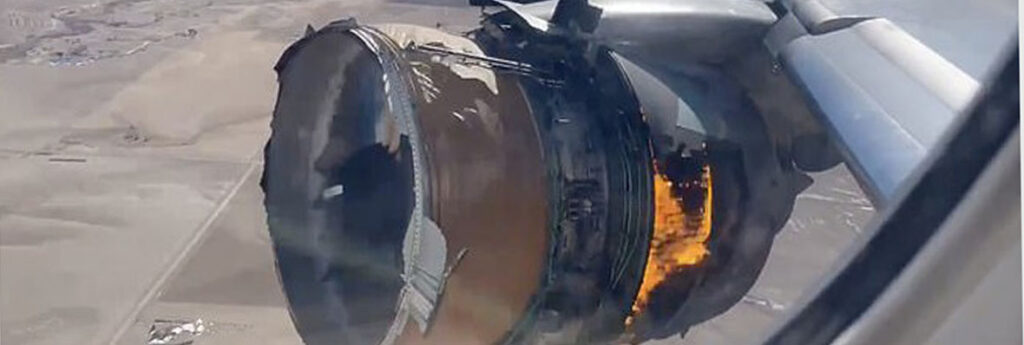United Airlines said late Sunday it will immediately halt all flights by its fleet of 24 Boeing 777 airplanes with the same type of engine involved in Saturday’s emergency landing in Denver. The airline said it will continue discussions with US regulators ‘to determine any additional steps that are needed to ensure these aircraft meet our rigorous safety standards and can return to service’.
David Delucia was settling back into his seat and starting to relax on his way to a long-awaited vacation when a huge explosion and flash of light interrupted an in-flight announcement and put him in survival mode.
The Boeing 777-200, headed from Denver to Honolulu on Saturday with 231 passengers and 10 crew aboard, suffered a catastrophic failure in its right engine and flames erupted under the wing as the plane began to lose altitude.
As Delucia and his wife prepared for the worst, people in this Denver suburb reacted in horror as huge pieces of the engine casing and chunks of fiberglass rained down on a sports fields and on streets and lawns, just missing one home and crushing a truck. The explosion, visible from the ground, left a trail of black smoke in the sky, and tiny pieces of insulation filled the air like ash.

Fortunately, the plane landed safely at Denver International Airport, and no one on board or on the ground was hurt, authorities said. But both those in the air and on the ground were deeply shaken.
“When it initially happened, I thought we were done. I thought we were going down,” said Delucia, who stuffed his wallet in his pocket so he could be easily identified if the plane did go down. “The pilot did an amazing job. It was pretty unnerving.”
FAA Administrator Steve Dickson said in a statement Sunday that based on an initial review of safety data, inspectors “concluded that the inspection interval should be stepped up for the hollow fan blades that are unique to this model of engine, used solely on Boeing 777 airplanes.”
The National Transportation Safety Board said in a separate statement that two of the engine’s fan blades were fractured and the remainder of the fan blades “exhibited damage.” The NTSB did caution that it was too early to draw conclusions about how the incident happened.
Video posted on Twitter showed the engine fully engulfed in flames as the plane flew through the air. Freeze frames from different video taken by a passenger sitting slightly in front of the engine and posted on Twitter appeared to show a broken fan blade in the engine.
United is the only US airline with the Pratt & Whitney PW4000 in its fleet, the FAA said. United says it currently has 24 of the 777s in service.
The NTSB said the cockpit voice recorder and flight data recorder were transported to its lab in Washington for the data to be downloaded and analyzed. NTSB investigations can take up to a year or longer, although in major cases the agency generally releases some investigative material midway through the process.
Former NTSB Chairman Jim Hall called the incident another example of “cracks in our culture in aviation safety (that) need to be addressed.”
Hall, who was on the board from 1994 to 2001, has criticized the FAA over the past decade as “drifting toward letting the manufacturers provide the aviation oversight that the public was paying for.” That goes especially for Boeing, he said.
Airlines in Japan and South Korea also operate planes with the Pratt & Whitney engine. Japan Airways and All Nippon Airways have decided to stop operating a combined 32 planes with that engine, according to Nikkei.
Nikkei reported that Japan’s Ministry of Land, Infrastructure, Transport and Tourism also ordered the planes out of service, and the ministry said an engine in the same PW4000 family suffered unspecified trouble on a JAL 777 flying to Haneda from Naha on Dec. 4. It ordered stricter inspections in response.

